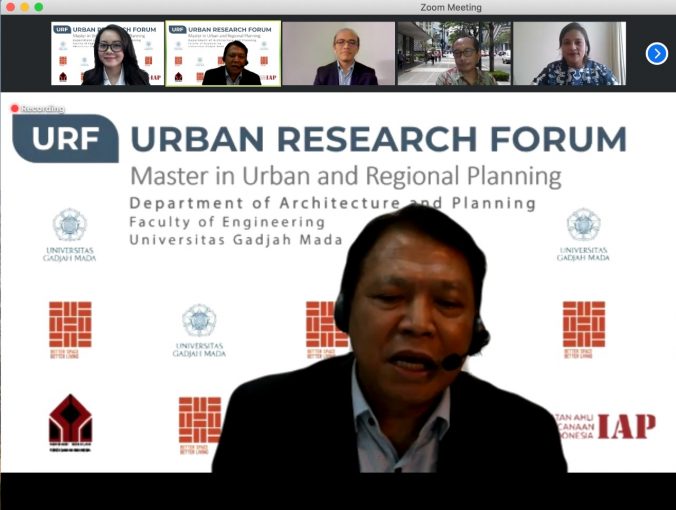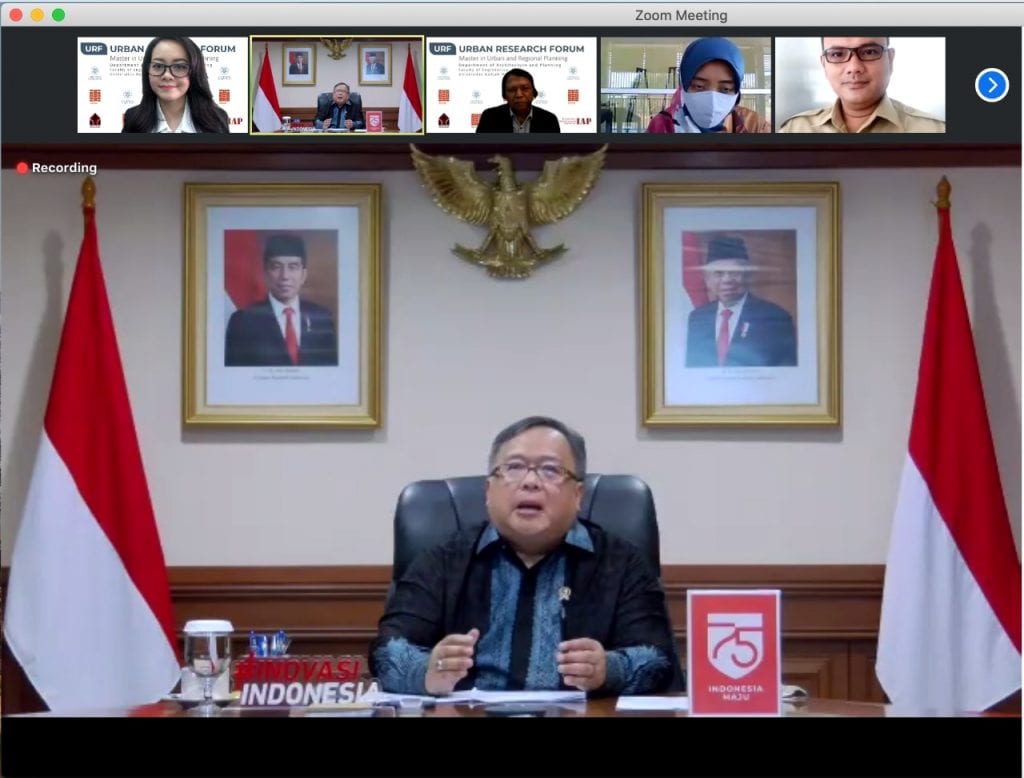
Urban Research Forum (URF) is an inclusive research platform, facilitating academia, scholars, professionals, and policymakers to share and to enrich their knowledge and experiences on Indonesian urban transformation.
The 2nd session of URF seminar was held on September 15th, 2020 from 10.00 until 12.30 with the theme “Urban Planning in the Disruption Era: Toward Indonesia Emas 2045”, was conducted online with 488 participants and YouTube live streaming with 1200 viewers. The moderator was Prof. Bakti Setiawan and host by Dr Tri Mulyani Sunarharum from Department of Architecture and Planning UGM.

The Keynote speaker was Prof. Bambang Brodjonegoro, The Ministry of Research and Technology of Indonesia. He discussed the challenges and opportunities for research, technology, and innovation in the disruption era. As “Indonesia Vision” to become one of the most powerful economic performances in the world in 2045, and there is a growing number in the urban population, the market opportunity becomes larger. As a result, skilled workers are urgently needed to support economic growth. Moreover, as a large number of natural resources, Indonesia should be natural resources-based manufacturing as economic growth driven. There should be a change in our paradigm, from a resource-driven economy to innovation-driven economics.
The second topic, presented by Gayatri Singh PhD from World Bank, is on Realizing Indonesia’s Urban Potential in the Era of Disruption. While urbanization helps prosperity globally, it does not guarantee happened in every country. Urbanization has already helped deliver prosperity to Indonesia but not as much as in its neighbours in East Asia. The primary reason why this has happened is inefficiency in urban development and a disconnected between planning and infrastructure investment. Indonesia has steady progress in improving access to basic services, but the gap remains. The three areas of attention in urban development suggested by Gayatri Singh. Firstly, truly embracing multi-dimensional resilience at the heart of urban development, secondly from sectoral silos to integration for transformation and lastly data ecosystem that includes communities.
The third presenter was Prof. Dr Deden Rukmana, who explained about “Planning Megacities in the Global South”. Megacities defined as a contiguous urban area with a population of over ten million people, and most of them are in Global South. In this Part, Prof Deden Rukmana explained rigorous comparative analyses, discussing the challenges, processes, best practices, and initiatives of urbanization in The Global South megacities. There are some key lessons from this topic discussion. For instance, rapid urbanization needs to be managed or reduce by planning policies particularly in peripheral areas, urban dualism is a distinct characteristic of megacities in the Global South, social and economic inequality should be the important lens in planning megacities, and creative and responsive plans are needed for developing infrastructure.
The last speaker is Wicaksono Sarosa PhD., who explains a civil society perspective in urban transformation Indonesia.
In our experience facing urbanization, there are not much infrastructure was built, causing a lot of unplanned area in the urbanized area.
With 82 million addition for urban population by 2045, doing business as usual, it will make the Java island population centris, endanger the few remaining fertile agriculture land, and the minimum benefit of urbanization. The national urban policy is needed to address this situation to make the urban area more livable, inclusive and “cultured”. SDGs and The New Urban Agenda could be guiding frameworks by local government to achieve Indonesia Emas 2045. In this presentation, the speakers also explain a few examples of an urban initiative related to SDGs target and The NUA.
The seminar ran very smoothly in which participants were very enthusiastic, with a lot of questions, and the number of participants both in Zoom Meeting and YouTube live-stream. The seminar was still able to watch on MPWK UGM YouTube Channel. The speaker’s presentation could be download in http://bit.ly/Paparan-URF2
